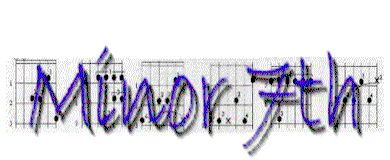

Barry Wedgle "Paradise", 2004
Guitarist Barry Wedgle has toured the world extensively, playing with everyone from Harry
Belafonte to Steve Lacy. He was reared on Hendrix but eventually moved on to jazz and
actually toured for a spell playing flamenco. "Paradise" finds Wedgle playing with
veteran jazz musicians, most notably, drum master Billy Hart, who has performed with
the best, from McCoy Tyner to Herbie Hancock. Wedgle plays a classical guitar throughout.
His compositions range from darkly ethereal -- "Love Life" and the title track bring to
mind mid sixties Wayne Shorter -- to Monkesque. The opening riffs of "Dumpling" are
humorously dissonant and playful. The melody, played in unison, then in harmony by Wedgle
and saxophonist George Garzone, jaunts, jabs and teases. What follows is an experimental,
loose, and enjoyable jam. Good fun.
©
Chip O'Brien
K.J. Denhert "Girl Like Me", 2003
K.J. Denhert's voice is a pleasing composite of soul á la Roberta Flack and blues á la
Bonnie Raitt. She describes her vibe as "urban folk and jazz" but somehow that implies
rough edges, and I hear nothing resembling rough here. In fact, Denhert's brand of
acoustic soul is so smooth that it's almost oleic. "Girl Like Me" is incredibly
well-produced.
©
Alan Fark
Lexington Guitar Trio "Dragons, Moods and Safaris" 2004
All too often I have found myself turned off from an otherwise good intentioned disc that
attempts a cursory glance at the cultural diversity of guitar music. I am therefore
pleased to report that this recent release by the Lexington Guitar Trio suffers not
from the ludic wanderings found in other such recordings. Rather, this ensemble
appears to have carefully compiled and researched their selections. An indisputable
highlight is the "Sakura Safari" by Bryan Johanson which is a truly epic rendition of
this well known Japanese melody. The most striking quality of this CD however,
is the absolute joy that it projects. There is no moment in this recording in which
this listener was not convinced of this trio's dedication to these works and their performance.
©
Timothy Smith
Eric Anders "Not At One", 2003
Judging by this impressive debut, singer-songwriter Eric Anders deserves a seat at the
table reserved for acclaimed contemporary alternative-pop troubadours such as Pete Yorn,
Belle & Sebastian, and Badly Drawn Boy. Folksy, low-key, introspective, and literate,
Anders weaves subtle melodies through timeless arrangements fortified by understated
orchestral textures, simple vocal harmonies, and clever counterpoint, especially from
cellist Guenevere Measham and voltage enhanced guitarist and occasional co-composer
Benedikt Bohm. From the breathy "Leaves Me Cold" to the retro-fitted "Leave You Doubtful"
and "Halcyon Days," Anders succeeds on pure lyrical and melodic honesty without falling
into the self-indulgent, shoe-gazing trap that plagues many artists in his genre. "Say
Goodbye Again" could be a hit with a bit of editing, and the spare acoustic intro on the
title track provides the perfect lead-in to Anders' shimmering falsetto vocals. Anders
is a can't miss on "Not At One".
©
Tom Semioli
JP Jones "Jeremiah", 2004
An early 1970s contemporary of Bonnie Raitt and Bruce Springsteen,
veteran singer-songwriter JP Jones offers his first solo all-acoustic release,
a masterful collection of story-telling, taught harmonies, and vivid imagery. With songs
based on his Fundamentalist Christian beliefs, Jones' world weary vocals and deft
acoustic guitar playing are a welcome breath of fresh, inspirational air in a modern
music world dominated by Pro-Tools, samples, and other distracting digital dabbling.
"New World A-Comin" and the title cut certainly evoke images of a young Bob Dylan /
Leonard Cohen via Jones' twisted melodies and harmonica punctuations emerging from the
clean, unobtrusive mix. The traditional "So Early In The Spring" employs a time-tested
descending baritone melody which runs counter to the swinging rhythms, another old-trick
worth resurrecting. Jones religious convictions are strong, but his lyrics never preachy
or elitist, which is why he's been making music for five decades and enjoys a strong cult
following.
©
Tom Semioli
Twiin "Call to the Sun", 2004
The combination of acoustic guitar and bass has always held a hallowed place in the
folk-pop pantheon, from the Smothers Brothers to Hot Tuna to Clone (Leo Kottke and
Mike Gordon of Phish). Singer/guitarist/song-writer David Linhart and electric
bassist/song-writer Jonathan Seigel continue the cherished tradition with this brilliant
collection of songs which draw primarily from folk and jazz idioms. Linhart and Seigel
intuitively embellish each cut with a myriad of unison lines, harmonies, contrasting
counter-point, odd time signatures, and angular rhythms while providing a solid anchor
for solos and flights of improvisation. The tongue in cheek humor of "Funeral" and the
surrealistic images of "Sorrow's Hole" and "Hideaway" are entertaining and defy
convention. Twiin is the kind of acoustic act that never grows tired. "Call To The Sun"
is a strong effort that'll sound just as good in ten, twenty, or thirty years from its
2004 release date.
©
Tom Semioli
Gutpuppet "Gutpuppet", 2004
There's a fine line between free-form improv and noodling. On this CD, Gutpuppet straddles this line
and occasionally careens off-course a little too often in their enthusiasm. Gutpuppet is duo Scott Ray on
dobro and Bill Barrett on chromatic harmonica, and their chops are fine (do I hear a hint
of early John Popper in Barrett's playing?)... nothing wrong here that a little structure
can't fix.
©
Alan Fark
"Without publicity, a terrible thing happens... nothing!"